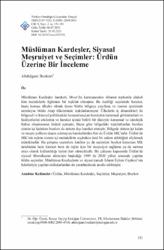Müslüman kardeşler, siyasal meşruiyet ve seçimler: Ürdün üzerine Bir İnceleme
Künye
Bozkurt, A. (2021). Müslüman Kardeşler, Siyasal Meşruiyet ve Seçimler: Ürdün Üzerine Bir İnceleme. Türkiye Ortadoğu Çalışmaları Dergisi, 8(2), 151-181. https://doi.org/10.26513/tocd.963336Özet
Müslüman Kardeşler hareketi, Mısır’da kuruluşundan itibaren toplumla alakalı
tüm meselelerle ilgilenen bir teşkilat olmuştur. Bu özelliği sayesinde hareket,
başta komşu ülkeler olmak üzere bütün bölgeye yayılmış ve zaman içerisinde
neredeyse bütün Arap ülkelerinde teşkilatlanmıştır. Ülkelerin iç dinamikleri ile
bölgesel ve küresel politikadaki konumlanışları hareketin kurumsal görünümünü ve
faaliyetlerini etkilemiş ve hareket içinde belirli bir düzeyde kurumsal ve ideolojik
farkın oluşmasının önünü açmıştır. Buna göre bölgedeki teşkilatlardan bazıları
sistem içi kalırken bazıları da sistem dışı hareket etmiştir. Bölgede sistem içi kalan
ve meşru yolların dışına çıkmayan hareketlerden biri de Ürdün MK’sidir. Ürdün’de
MK’nin rejime sistem içi muhalefette seçimlere özel bir anlam atfettiğini söylemek
mümkündür. Bu çalışma seçimlere katılım ya da seçimleri boykot kararının MK
tarafından hem hareket hem de rejim için bir meşruiyet sağlama ya da sarsma
aracı olarak kullanıldığı tezini ileri sürmektedir. Bu çalışma kapsamda Ürdün’de
siyasal liberalleşme sürecinin başladığı 1989 ile 2020 yılları arasında yapılan
bütün seçimler, Müslüman Kardeşlerin ve siyasi kanadı İslami Eylem Cephesi’nin
liderleriyle yapılan mülakatlardan da yararlanılarak analiz edilmiştir. Since its foundation in Egypt, Muslim Brotherhood (Al-Ikhwan Al-Muslimin) has
always been an organization that is interested in all forms of social issues. This
feature of the movement facilitated the organization’s spreading across the region,
especially to the neighboring countries, and institutionalization in almost all the
Arabian countries in the course of time. The internal dynamics of the countries
in which the movement is organized and the stances of these countries towards
regional and global problems have affected the organizational appearance and the
activities of the movement and paved the way for a certain level of country-specific
institutional and ideological variations. While some of the branches acted in line
with the rules of the political system of the countries they are operating in, others
challenged it. Jordanian Muslim Brotherhood has been among the first group, so it
has had legally legitimate relations with the country’s political system. In Jordan,
it is possible to say that the movement attributes special meaning to the elections
–in the form of both participating and boycotting– to form a legitimate opposition
towards the regime. This study argues that the movement uses the decision to
participate in the elections or boycotting them as a means of legitimizing or
undermining the regime, which in return also confirmed the legitimacy of the
movement. This paper studies all the elections held in Jordan since the political
liberalization process started in the country (1989-2020) and analyzes them using
personal interviews with the leaders of the Muslim Brotherhood and its political
wing, the Islamic Action Front.


















